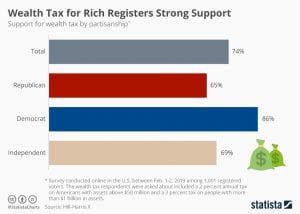 A ceasefire has brought an end to weeks of increasing violence between Israel and the Palestinian communities in the territory it controls, particularly the Palestinian Islamic-nationalist group Hamas. This latest outbreak of conflict ended a period of relative calm that had persisted for the better part of a decade. Adding to the complexity of the Israeli-Palestinian conflict is the role of the United States and emerging disagreements over what the nature of that role should be.
A ceasefire has brought an end to weeks of increasing violence between Israel and the Palestinian communities in the territory it controls, particularly the Palestinian Islamic-nationalist group Hamas. This latest outbreak of conflict ended a period of relative calm that had persisted for the better part of a decade. Adding to the complexity of the Israeli-Palestinian conflict is the role of the United States and emerging disagreements over what the nature of that role should be.
Israel’s history has been fraught with struggle and violence between Israeli Jews and Palestinian Arabs, even before the state of Israel was founded in 1948. Numerous wars with neighboring Arab countries and the lingering consequences of those wars also inform this issue.
If you’re looking for more information on the broader history of Israel and its Palestinian population, check out “Israel-Gaza Violence: The Conflict Explained” from BBC News.
Timeline of the Current Conflict
While the full history between Israelis and Palestinians is beyond the scope of this blog post, the current conflict does have an immediate timeline of events that can help shed light on the situation.
- APRIL 13: The first night of Ramadan (Islam’s most sacred month) in 2021 coincides with Israel’s Memorial Day commemorations. The president of Israel, Reuven Rivlin, is set to make a speech at the Western Wall near the Al-Asqa Mosque. The Western Wall and the site of the Al-Asqa Mosque are sacred sites to Jews. However, Al-Asqa itself is currently open only to Muslims, as it is among the most sacred sites in Islam as well.1 The president’s team requests that the loudspeakers that are used to call Muslims to prayer be turned off during his address, claiming that they could drown out the speech. The mosque refuses the request but Israeli police enter the complex and allegedly disconnect the loudspeakers, sparking backlash from Muslims in Israel, most of whom are Palestinian.2
- APRIL 13 – MAY: The Al-Asqa controversy occurs in the midst of growing unrest surrounding the attempted eviction of several Palestinian families from their homes in Sheikh Jarrah, a neighborhood of East Jerusalem. Protest and unrest continue to escalate throughout April, with direct fighting taking place between pro-Palestinian protesters and Israeli police and pro-Israeli counterprotesters. Forming a backdrop to all of this are political crises in both the Israeli and Palestinian governments, adding to the instability of the situation.3
- MAY 4: Hamas, which the United States has officially labeled as a foreign terrorist organization, presents itself in the midst of this crisis as the bold, revolutionary leadership that the Palestinian people need to assert their rights and independence. It announces a “final warning” on May 4, declaring that Palestinian residents of Sheikh Jarrah must be allowed to remain and, more broadly, that the Israeli police and military must stop clashing with Palestinian demonstrators.4
- MAY 7: On the last Friday of Ramadan, Israeli police raid the Al-Asqa Mosque. Police claim that the action is in anticipation of the site being used as a gathering and supply storage space for violent Palestinian demonstrators. The Arab-Palestinian community responds with even more demonstrations, and violent clashes between Jewish and Arab groups spread throughout the country.5
- MAY 10: Coinciding with the final hearing in the Sheikh Jarrah case and celebrations and demonstrations for Jerusalem Day (a holiday celebrating East Jerusalem coming under Israeli control following the Six Day War in 1967), another raid takes place at Al-Asqa. At 6 pm, Hamas launches 150 rockets from the Gaza Strip into Israel. Israel’s Iron Dome missile defense system intercepts many of the rockets. Ultimately, no one is killed in the attack but the rockets injure some people and damage property.6
- MAY 10 – MAY 20: Immediately following the rocket attack, which in part targeted the capital, Jerusalem, the Israeli military begins an airstrike campaign killing 20 people, including nine children. Hamas rocket fire, street clashes, Israeli airstrikes, and military and police actions continue. Thus far, the conflict has resulted in deaths of more than 200 Palestinians and 12 people in Israel, with thousands more injured and hospitalized on all sides. Adding to the tensions are rocket attacks that are suspected of originating in Syria and Lebanon, as well as growing anti-Israel/pro-Palestinian demonstrations in neighboring Lebanon and Jordan. Across the world, demonstrations are also taking place with various groups demanding support or condemnation for the actions of Israel and Hamas.7
- MAY 20: Israel and Hamas agree to a ceasefire to be monitored by Egypt.8
The U.S. Response
Historically, the United States has been a strong supporter of Israel and it remains among Israel’s closest allies. Public support for Israel, and specifically for the Israeli people, has remained fairly widespread in the United States, with roughly 70 to 75 percent of Americans expressing a favorable view of Israel in Gallup polls between 2018 and 2021. Sentiment toward the Palestinian Authority has gradually warmed over time, with favorability increasing from 21 percent in 2018 to 30 percent in 2021.9
A possible result of this shifting sentiment is an increasing number of lawmakers, particularly liberal Democrats, speaking out against U.S. policy toward Israel. Representative Rashida Tlaib, D-Mich., the nation’s first Palestinian American elected to Congress, has been vocal in her opposition to the Biden administration’s statements of support for Israel in this conflict and has spoken frequently about crimes she alleges Israel has carried out against its Palestinian population.10 Representative Alexandria Ocasio-Cortez, D-N.Y., also made headlines when she recently drafted a resolution to block a $735 million arms sale to Israel, a resolution which has gained the support of other prominent officials such as Senator Bernie Sanders, I-Vt.11 Most Democratic leaders have yet to publicly make such criticisms, but the willingness of any national politician to be so openly critical represents a significant development and a likely shift in Democratic voters’ opinions.
On the other side of the aisle, Republicans have remained steadfast in their support for Israel, choosing either to not comment beyond voicing their support for Israel’s right to defend itself or to outright condemn Democratic colleagues who have voiced opposition. Senator Ted Cruz, R-Texas, accused Ocasio-Cortez and other Democrats of “regularly engaging in hateful antisemitic and anti-Israel rhetoric,” while Senator Tom Cotton, R-Ark., has criticized the Biden administration and suggested that President Joe Biden will yield to the “far-left” and block the upcoming arms sale.12
For its part, the Biden administration has been relatively cautious in its public statements on the Israeli Palestinian conflict. Initially, the administration made little commentary beyond President Biden affirming Israel’s right to protect its interests.13 However, on May 19, it was reported that President Biden held a call with Israeli Prime Minister Benjamin Netanyahu urging a de-escalation of the conflict. Despite this, Netanyahu recommitted to the offensive against Hamas as necessary for any ceasefire to occur.14 Although a ceasefire has now been agreed to, this seeming divide between the two leaders has fueled speculation about how the U.S.-Israeli alliance will evolve moving forward.
Discussion Questions
- What are questions you have about the current and historical Israeli-Palestinian conflict? What do you know for certain about the region and its people? What are areas you need to learn more about?
- What do you believe the role of the United States should be in conflicts outside of the country? What role could the United States play if it is not already doing so?
- For decades, the typical response of U.S. politicians regarding conflict in Israel has been that “Israel has a right to defend itself.” Do you agree with that sentiment? To what extent? Is that sentiment alone sufficient to address the issue? Why or why not?
Related Posts:
U.S. Iranian Relations Following the Death of Qasem Soleimani
President Trump Seeks to Further Reduce U.S. Military Presence in Syria
Calm or Chaos: The Role of the Media During a Crisis
As always, we encourage you to join the discussion with your comments or questions below!
Sources
Featured Image Credit: GETTY IMAGES
[1] https://www.aljazeera.com/features/2017/12/6/al-aqsa-mosque-five-things-you-need-to-know
[2] https://www.nytimes.com/2021/05/15/world/middleeast/israel-palestinian-gaza-war.html
[3] https://www.cbsnews.com/news/israel-palestinians-sheikh-jarrah-eviction-east-jerusalem-explained/
[4] https://www.nytimes.com/2021/05/15/world/middleeast/israel-palestinian-gaza-war.html
[5] Ibid.
[6] https://www.cbsnews.com/news/israel-iron-dome-rockets-gaza-hamas/
[7] https://www.dw.com/en/timeline-how-the-current-israel-hamas-conflict-has-expanded/a-57573511
[8] https://www.reuters.com/world/middle-east/hamas-official-predicts-ceasefire-soon-israel-gaza-fight-goes-2021-05-19/
[9] https://news.gallup.com/poll/340331/americans-favor-israel-warming-palestinians.aspx
[10] https://www.nytimes.com/live/2021/05/18/us/joe-biden-news-today/tlaib-biden-palestine-israel#tlaib-biden-palestine-israel
[11] https://www.usatoday.com/story/news/politics/2021/05/20/sanders-follows-aoc-tlaib-objecting-us-arms-sale-israel/5179770001/
[12] https://www.timesofisrael.com/us-republicans-seek-to-use-israel-hamas-fighting-to-divide-democrats/
[13] https://www.business-standard.com/article/international/biden-calls-netanyahu-says-israel-has-right-to-defend-itself-121051600045_1.html
[14] https://www.usatoday.com/story/news/politics/2021/05/19/biden-says-he-expects-significant-de-escalation-today-gaza/5162735001/

 President Joe Biden is currently promoting his plan to transform the U.S. economy.1 In a previous
President Joe Biden is currently promoting his plan to transform the U.S. economy.1 In a previous  President Joe Biden is currently campaigning to promote his administration’s infrastructure plan. The plan is intended to address three main areas of concern: crumbling or inadequate infrastructure, job creation and economic growth, and environmental issues. In this post, we will focus on the infrastructure goals of the plan.
President Joe Biden is currently campaigning to promote his administration’s infrastructure plan. The plan is intended to address three main areas of concern: crumbling or inadequate infrastructure, job creation and economic growth, and environmental issues. In this post, we will focus on the infrastructure goals of the plan.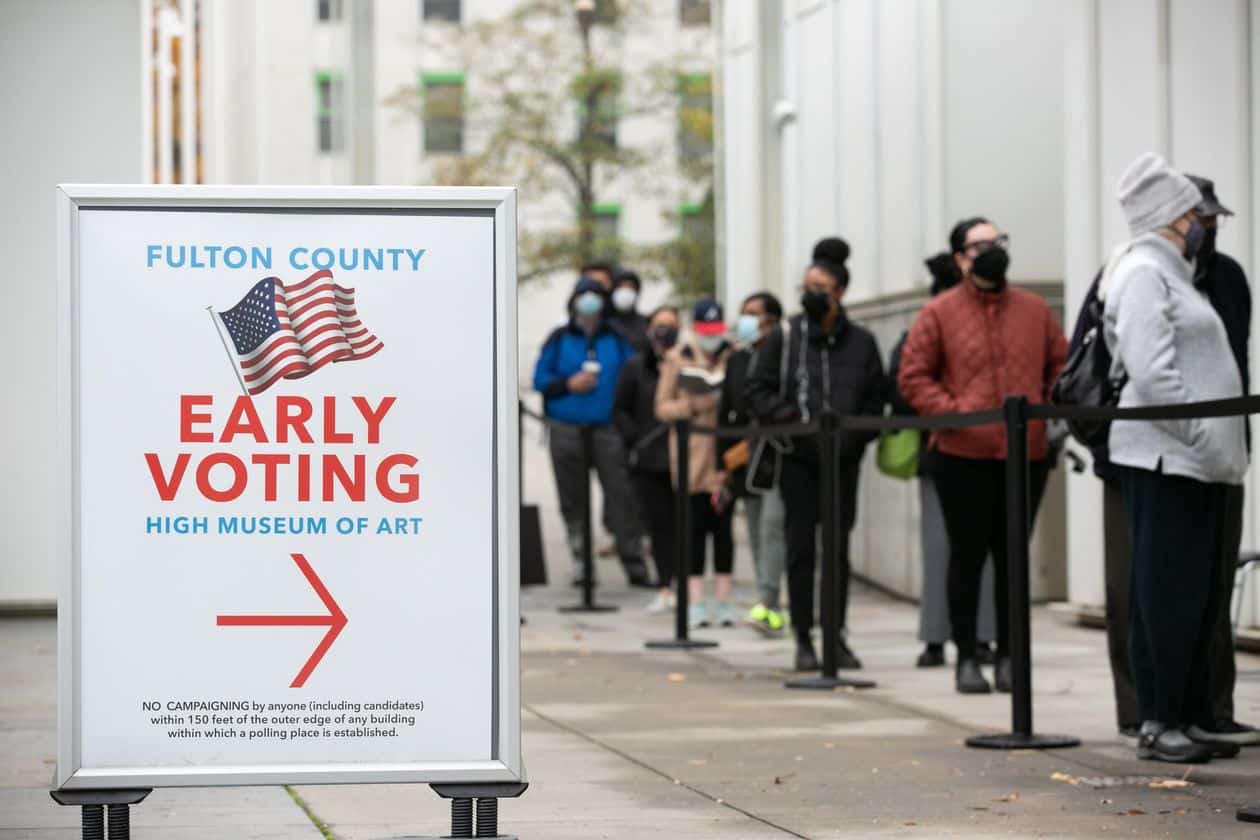 On April 3, 2021, the Georgia General Assembly passed the Election Integrity Act of 2021. This new voting law enacts sweeping changes to Georgia’s election system which could have significant implications for the outcome of future elections. Republicans in Georgia and across the United States have hailed the law as a vital and necessary reform to enhance the security of elections, with similar measures coming before legislatures in Arizona, Florida, Iowa, and Texas.1 Democrats, including President Joe Biden and Georgia voting activist Stacey Abrams, have described the law as modern day Jim Crow, invoking the obstacles put in place prior to the Voting Rights Act of 1965 to prevent people of color from voting throughout the American South.2,3
On April 3, 2021, the Georgia General Assembly passed the Election Integrity Act of 2021. This new voting law enacts sweeping changes to Georgia’s election system which could have significant implications for the outcome of future elections. Republicans in Georgia and across the United States have hailed the law as a vital and necessary reform to enhance the security of elections, with similar measures coming before legislatures in Arizona, Florida, Iowa, and Texas.1 Democrats, including President Joe Biden and Georgia voting activist Stacey Abrams, have described the law as modern day Jim Crow, invoking the obstacles put in place prior to the Voting Rights Act of 1965 to prevent people of color from voting throughout the American South.2,3 Last month, nearly 19,000 unaccompanied migrant children were stopped at the U.S.-Mexican border, a record since documentation began in 2010, beating a previous record set in May of 2019.1 Currently, the Biden administration is allowing only children traveling alone to stay in the U.S. while their asylum claims are being evaluated, a process that can take up to five years due to the large backlog of cases.2 Apprehended adults, even those claiming asylum, are being turned away under Title 42, a Centers for Disease Control policy that was implemented last year in order to reduce the spread of COVID-19.3
Last month, nearly 19,000 unaccompanied migrant children were stopped at the U.S.-Mexican border, a record since documentation began in 2010, beating a previous record set in May of 2019.1 Currently, the Biden administration is allowing only children traveling alone to stay in the U.S. while their asylum claims are being evaluated, a process that can take up to five years due to the large backlog of cases.2 Apprehended adults, even those claiming asylum, are being turned away under Title 42, a Centers for Disease Control policy that was implemented last year in order to reduce the spread of COVID-19.3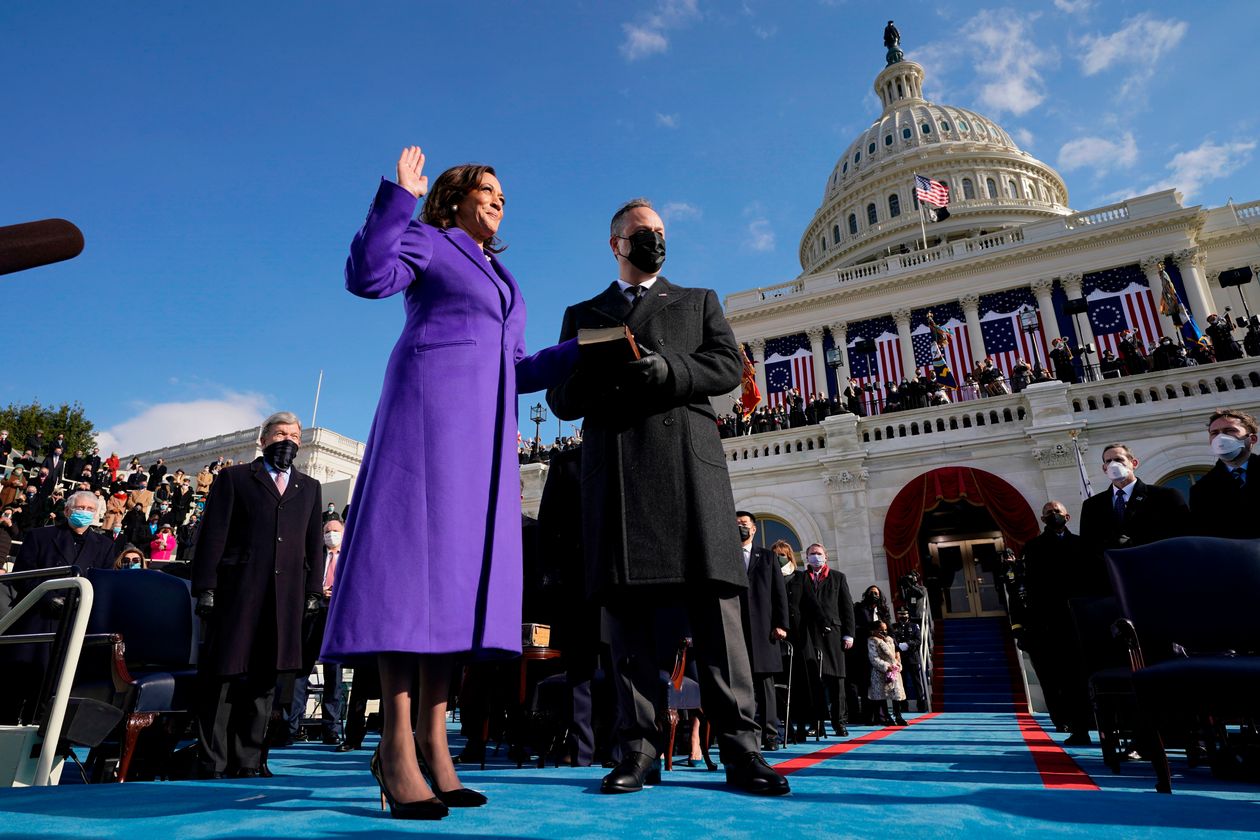 The year 2021 has already been a ground-breaking one for women in national politics. Vice President Kamala Harris became the first woman and person of color to hold the office, the 117th Congress includes the largest number of female members in U.S. history, and President Joe Biden’s cabinet will ultimately include 11 women, setting a new record. The number of women in the cabinet is particularly noteworthy; with 13 men making up the rest of the cabinet, the positions are almost evenly split (although among the heads of the executive departments, there are five women and ten men).1 During this Women’s History Month, just over 100 years since women had their right to vote ratified in the Constitution, the continued expansion of the role of women in government is worth celebrating.
The year 2021 has already been a ground-breaking one for women in national politics. Vice President Kamala Harris became the first woman and person of color to hold the office, the 117th Congress includes the largest number of female members in U.S. history, and President Joe Biden’s cabinet will ultimately include 11 women, setting a new record. The number of women in the cabinet is particularly noteworthy; with 13 men making up the rest of the cabinet, the positions are almost evenly split (although among the heads of the executive departments, there are five women and ten men).1 During this Women’s History Month, just over 100 years since women had their right to vote ratified in the Constitution, the continued expansion of the role of women in government is worth celebrating.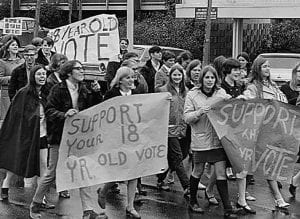 Congress passed the 26th Amendment in March 1971; it was ratified by the states and signed by President Richard Nixon by July of that same year.1 The amendment lowered the voting age to 18. It reads:
Congress passed the 26th Amendment in March 1971; it was ratified by the states and signed by President Richard Nixon by July of that same year.1 The amendment lowered the voting age to 18. It reads:

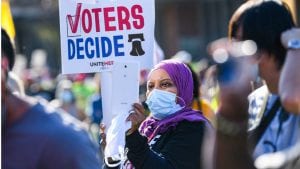 The past several election cycles have seen high-stakes fights over access to the ballot and the rules that govern elections. In 2013, the Supreme Court invalidated provisions of the Voting Rights Act, thus making it easier for states to change their voting laws.1 In the years since, conservatives in Congress and in state legislatures have argued in favor of policies that tighten voter ID requirements and voting processes.
The past several election cycles have seen high-stakes fights over access to the ballot and the rules that govern elections. In 2013, the Supreme Court invalidated provisions of the Voting Rights Act, thus making it easier for states to change their voting laws.1 In the years since, conservatives in Congress and in state legislatures have argued in favor of policies that tighten voter ID requirements and voting processes. During her 2020 presidential bid, Senator Elizabeth Warren, D-Mass., put forward a tax on the wealthiest Americans—a so-called ultra-millionaire tax—as one of her central proposals.1 And on March 1, 2021, Warren introduced the Ultra-Millionaire Tax Act, which would “create an annual tax of 2 percent on the net worth of households and trusts between $50 million and $1 billion and a tax of 3 percent on net worth above $1 billion. The rate for net worth above $1 billion would increase to 6 percent if a ‘Medicare for All’ health care plan is enacted.”2
During her 2020 presidential bid, Senator Elizabeth Warren, D-Mass., put forward a tax on the wealthiest Americans—a so-called ultra-millionaire tax—as one of her central proposals.1 And on March 1, 2021, Warren introduced the Ultra-Millionaire Tax Act, which would “create an annual tax of 2 percent on the net worth of households and trusts between $50 million and $1 billion and a tax of 3 percent on net worth above $1 billion. The rate for net worth above $1 billion would increase to 6 percent if a ‘Medicare for All’ health care plan is enacted.”2